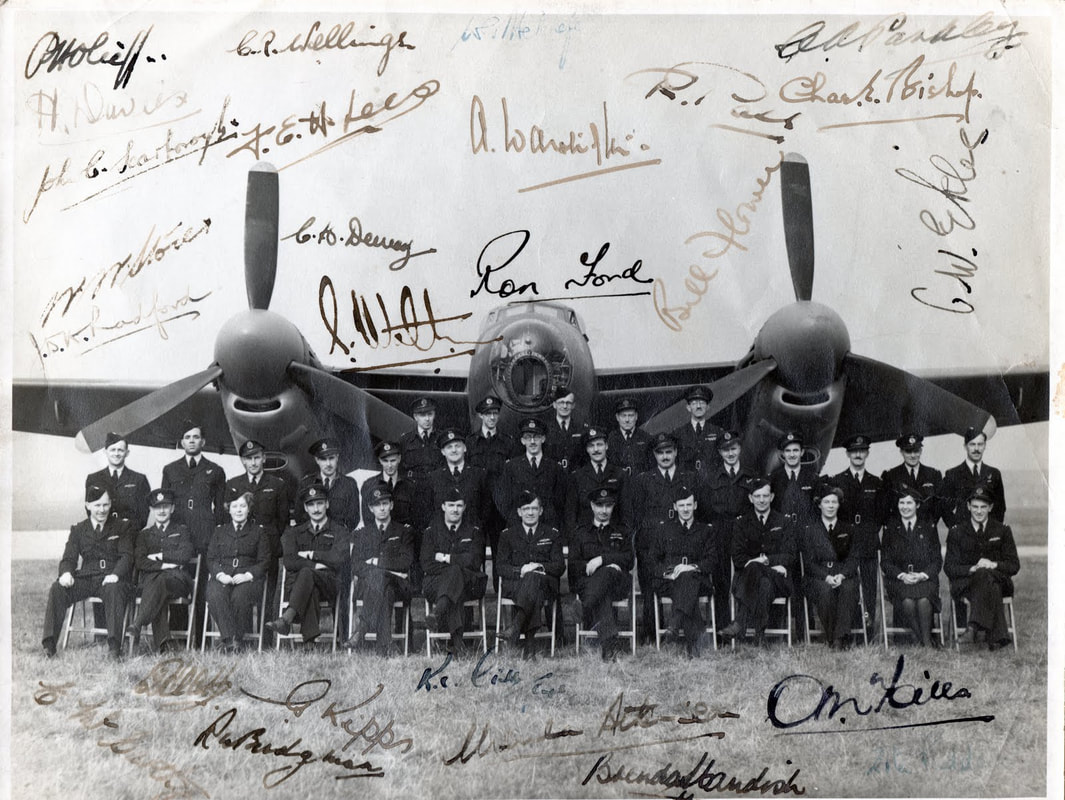|
One of the fascinating aspects of this project is the way in which stories that have featured on the website stimulate further contributions as more information becomes available. The story of the Weeks family is one of the more widely known stories locally and features in our current exhibition at the East Riding Treasure House. Through his own contacts Richard Weeks has gained a further insight into the exploits of his father Fred during the Second World War from Caroline Gaden, the daughter of Ron Ford who had been his war-time colleague. Both Ron and Fred appear in the photograph opposite of the Air Transport Auxiliary (ATA) "Ferry Group 7" standing in front of a Mosquito aeroplane, probably taken at their base in Sherburn in Elmet. Fred had previously been involved in a fatal plane crash in April 1940 that killed 3 whilst working as a civilian flight engineer for Blackburn Aircraft Co, in Brough whilst testing a prototype flying board, the B20. Fred went on to join the ATA in 1942 as a flight engineering officer. The ATA were known as the Ancient and Tattered Airmen (or women) as most had been rejected by the RAF. Ron Ford was born in Hovingham, North Yorkshire and flew from an early age and won a flying scholarship. Ron joined the ATA as a pilot in July 1942 and met Fred almost straight away during training in Luton as described below: "Initially Ron was posted to the Elementary Flying Training School at Barton near Luton. Accommodation was hard to find and when he arrived by train he couldn’t find a bed so he went to the Police Station and asked for help. An officer refused to put him up in the cells and took him to some digs. Ron was nonplussed when the man who opened the door was of African extraction (Fred Weeks), he had never met a person with a different coloured skin to his own, but he ended up happily staying for the few weeks he was posted there." [1] After the initial training the two men worked together at their base in Sherburn in Elmet. In Ron Ford’s logbook the first mention of Fred being Ron Ford’s Flight Engineer is 8th September 1944 when the two of them flew a Halifax bomber from York to Hawarden in Wales. The majority of active airfields were in the east of the country and this flight would have been a damaged bomber being ferried from an active airfield to the safe side of the UK for repair. In reverse they flew new or repaired aircraft back saving "real" pilots for active service. Their base was Sherburn in Elmet and they had known each other since training in 1942. In total there are 18 flights logged as working together. A fascinating insight into their personal chemistry is from the following extract recounted by Caroline Gaden: "Freddie Weeks was his flight engineer. His father was African and his mother was English. Despite Ron’s reaction to his Luton billet he was happy to work with Fred and the two became great friends. Fred had survived a fire and crash with another pilot in a Catalina. His parachute had the release pins blown out so Fred couldn’t pull the pin to get it to open. Luckily for him the small ‘chute did open and pulled the big one with it and he survived. Fred refused to sit up front if the weather was ‘duff’. He’d retire to the back of the plane because he didn’t want to see himself die. Fred and Ron remained friends after the war and socialised together until Ron emigrated to Australia to be with his grandchildren, he died in 1999 aged 87. As an additional insight into the local war time experience for people of African descent, Ron’s daughter Caroline Gaden has given permission to quote her mother’s own observations: "I think initially there was very much a city v country divide ... rural folk had far less likelihood of meeting migrants from other countries, I'm sure for city folk it was far more common and I do wonder if the war actually helped break down some of the barriers ... everyone was in it together and bombs did not discriminate. I would think that the more industrialised areas in cities with cotton and woollen mills, armament and aeroplane factories and other 'war needed' vehicles would have much greater integration ... but did they socialise or did they head their separate ways after work ... I really don't know. But everyone shared the fear and food and sing-songs as bombs rained down." Caroline herself adds: "…re your father (Fred Weeks) selling the agricultural machinery... I think farmers are a canny lot, they would have been concentrating on what the equipment could do for them. In addition the war did do a lot to break down barriers.... some people put them straight back up post-war but many recognised the contribution made by others... there was probably more antagonism (for want of a better word) or less trust directed towards people who had lined their own pockets during the war or who had found a cushy job away from the bombs and bullets. People who served, of all shapes, sizes, creeds and colours were recognised for their service and given the respect and trust they had earned. Thank you to Richard Weeks and Caroline Gaden for sharing their memories.
0 Comments
Your comment will be posted after it is approved.
Leave a Reply. |
Follow usArchives
April 2023
Categories
All
|

 RSS Feed
RSS Feed